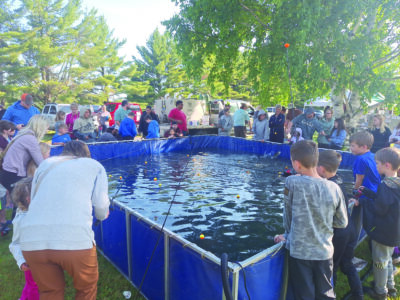Presentation looks at connections between mental health, addiction

Graham Jaehnig/Daily Mining Gazette On May 27, 2021, a panel of more than a dozen area law enforcement officials, healthcare, mental and behavioral health experts and medical professionals gathered in person and via internet to conduct a community conversation to explain mental health services and programs available to people in the western Upper Peninsula, as well as limitations to access. Sadly, limitations resulting from lack of staffing, funding, insurance access, are not limited to the Copper Country; it is a national trend that is reaching a critical issue.
EAGLE RIVER — At Phoenix House, in Calumet Township, residential substance abuse services are provided to males, 18 years and older, who require an intensive service due to the debilitating nature of their addiction, and have severe symptoms with coexisting biomedical complications or conditions, emotional or behavior issues, and a living environment that is not conducive to recovery.
The goal of residential services is to gain stabilization in these areas and move the consumer to a lower level of care. Residential services provide consumers with an environment that is substance free, and structured, focusing on developing recovery skills and healthy life skills, while taking care of the individual needs of the consumer. Each consumer has an individual treatment plan that focuses on their individual needs based on their assessment. However, a patient with a dual diagnosis may be more intensive than local facilities are equipped to handle.
Richard Ellingsen, DP, Residential Counselor at Phoenix House for more than four years, discussed the limitations of local facilities to handle such cases to the audience and panel at the May 27 Mental Health Presentation at the Keweenaw County Courthouse.
“Primarily, we only deal with substance use, although mental health does obviously come along with substance use a lot of the time,” Ellingsen said, “and lots of times it is drug-induced mental health issues, so a lot of the clients come in from jail, and a lot of time, their head clears up by the time they get to treatment, but a lot of the time, it’s not the case and sometimes it’s more permanent.”
Ellingsen said the Phoenix House is not fully equipped to handle many of the mental health issues when it comes to the permanent cases. The facility attempts to handle co-occuring disorders, he said, and a psychologist that comes in weekly to talk to the clients who wish to see him.
“But quite often, we have clients come in whose mental health is so severe that they are incapable of getting clean until they handle the mental health,” said Ellingsen, “and a lot of times, we have a hard time referring them out, because they don’t meet the specified needs that Copper Country Mental Health might require, or a lot of times, they’re not suicidal, so we can’t send them to Marquette, or they’re not dangerous, so we can’t send them to Marquette or War Memorial Hospital in Sault Ste. Marie.”
A person with dual diagnosis has both a mental disorder and an alcohol or drug problem. These conditions occur together frequently. About half of people who have a mental disorder will also have a substance use disorder at some point in their lives and vice versa.
“We had a problem the other day, where we had to unfortunately ask someone to leave, because we weren’t more equipped to handle it,” said Ellingsen. “We refer them to access psychological, but he was already seeing them, and unfortunately, we have a problem as far as resources go in mental health. We don’t have many psychologists locally, and it’s a problem.”
Access Psychological is a medical group that has only one practice medical office located in Marquette. There are two health care providers, specializing in psychologist, clinical, psychiatry, and clinical social work, being reported as members of the medical group. Medical taxonomies which are covered by Access Psychological Pc include psychologist, psychiatry, student in an organized health care education/training program, clinical, addiction (substance use disorder).
Ellingsen said the recent COVID pandemic has, like so many other facilities, been a likely reason for a decrease in people seeking help. Currently the facility has only five men in residential treatment, while a year ago, that number was typically nine to 12.
“We also offer outpatient services there, in Calumet,” he said. “Those numbers are a lot higher than our residentials. We have an outpatient office in Ontonagon and Bessemer as well.”





